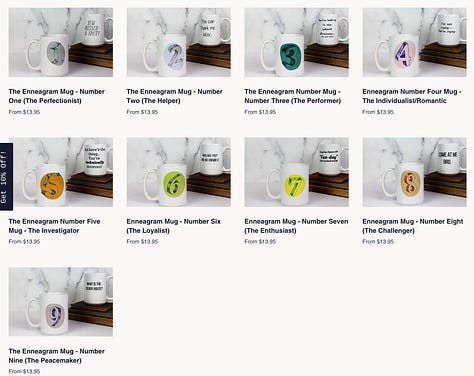Who is selling the self-help?
meanderings about the easy, simple answer.

In preparation for the self-help deluge in January.
The whole idea of astrology as a personality map isn’t all that old, but it does have a lot of sense and internal logic to it. The planets can easily stand for archetypal impulses and their locations and relationships can easily map to describe what might emerge for you. And a lot of people gain a lot of value out of that. Still, that has always felt flat to me. It wasn’t until I learned about the complexity of traditional astrology and its orientation toward circumstance that things began to click.
In astrology, we see the people of the Hellenistic era describing how the locations of planets at birth will set up a person for lifetime success (maybe Jupiter and the Moon in Cancer in the first house)—eventually, in 2023, this same arrangement might be interpreted by a psychological astrologer as indicating a person who is generous, internally secure, and emotionally expansive. I’d suggest that it’s a lot easier to be generous, secure, and to offer emotional expansiveness when your circumstance is abundant and “blessed” in the way that Jupiter in Cancer might describe. Context defines the personality.
Ancient astrologers who were building the foundations of theory that are still at the base of anything written or shared today were not thinking about a person out of context. In a very real way, privilege and institutional power were considered as key considerations before reading a chart.
When discussing interacting with a chart to pick good times to perform acts such as a marriage, the 8th century astrologer Sahl Ibn Bishr said: “All are agreed that elections are weak, except those for kings … But you should not elect anything for the low-class and for merchants and for those who follow in social status, unless it is based upon their nativities and the revolutions of those years and the nativities of their children.” The rules of fate are different for the powerful and wealthy than they are for the middle classes and the disenfranchised. To suggest that someone could present a rule that applies to everyone (“if you’re an Aries you’re an asshole and if you’re a Scorpio you’re mean”) without thinking about the relative privilege and context of the person wouldn’t make sense to an ancient astrologer and it shouldn’t make sense to you.
To take it back out of the space of astrology for a second, which, admittedly, is very woo woo, we can look at the Enneagram. The Enneagram is also ancient, originating in some form or another in the 10th - 12th centuries AD. That timeline is a guess, but we know that Jewish and Sufi mysticism that underlie the structure of the Enneagram were being developed and practiced around that time.
The Enneagram doesn’t work like other esoteric systems in that you can’t figure out someone’s Enneagram type by knowing their birth date and time, you can’t read their palm to learn their childhood wounds, and Tarot won’t tell you much about their instinct stacking. You have to approach it by understanding your own behaviors and reactive triggers. But what the Enneagram does have in common with astrology is that whatever structures are at play were already being set into place before you were born. With astrology, it’s the slow march of the planets, and with the Enneagram it’s all the genetic and epigenetic predispositions along with the relative privilege that you were born into. These things that describe the moment of your birth are, in either system, the form within which the events of your life take place.
What was particularly interesting to me when I began studying the Enneagram was that I did not see an end to the exploration that was possible. It was complicated and deep. That was different from my brief but intense dives into Meyers-Briggs and DISC and all the other corporatized ways of describing how a person is wont to behave for management purposes. The Enneagram suggested a kind of ceilinglessness, an open endless sky, through which I could explore and reflect with the support of the strong foundation provided by the type structure.
No one who I have ever known to study the Enneagram finds that it hems them in or over-defines them. Instead, there is context and guidance in moments where you feel your inner wounds activated. You know the tenor of that activation and aren’t made to feel crazy for feeling crazy. Something significant I realized early on studying the Enneagram is that there’s no way out of the personality you have—all you can do is work on your context and your reactions. Whatever shitty pattern you find yourself running through every day because you’re a Type 5 and you are terrified of being known and taken over isn’t going away and if it did it would just be replaced by some other type’s shitty daily pattern. This, for me, was freeing.
Of course, the more complicated and useful a system is, the more susceptible it is to being capitalized on and squeezed into a simple, digestible format for profit. This has happened to the Enneagram off and on for several decades now with a peak in recent years.
First there was the popularity of a few evangelical and evangelical adjacent podcasts, then the meme farms and dropshipped products. Then the personal development crowd that markets services to corporations to help grown men learn to communicate with other grown men has carved the Enneagram into something sellable there too. I assume that from time to time these lessons at work, church, and online are able to translate to something deeper, more wise, and more mysterious, but I also am cynical enough to know that at a certain point the Enneagram too can be watered down to nothing.



It’s obvious that for a long time now the capitalism juicer has been at work on astrology, squeezing out bite sized content and shareable media that holds attention between advertisements. In that form it’s usually interesting, often frustrating, and can ignite whatever emotional response will drive up virality and profitability. This does not leave much room for the mystery and slowness that makes something like astrology impactful.
My friend Valerie sent me a reel recently from a widely followed astrologer that I hadn’t seen before (there are so many astrologers who are talented and educated and so many who are not and are not). I have no idea if this astrologer has a practice rooted in a particular tradition or where she learned her approach, but, based on how this astrologer shared it, I assume it’s got some sort of theoretical base.
She described a concept she called “degree theory” which assigns specific sign affinity to individual degrees. Valerie asked what I thought of the technique and whether or not it would be useful for understanding her own Moon placement. I told her I hadn’t heard of this exact approach, but it sounds very similar to a lot of other old techniques like dodecatemoria or the Egyptian bounds that subdivide zodiac signs up into smaller sections. These are valid and necessary for techniques used by astrologers at various times since the early hundreds AD. What you have to be wary of is the tendency of capitalism to push people to generate narrow, contextless ideas that can be sold to you as a simple answer. I’ve run into this with astrology and with the Enneagram (looking at you, “wings”). What I said to Valerie and what I’d say to anyone is that if a technique adds useful texture, prompts challenging questions, and makes sense, then use it.
As “personal development” content runs wild on your feeds in the first month of the new year, it is worth avoiding simple answers. I think this applies in most contexts, but especially when it comes to self-understanding. Anyone purporting to have an answer for you rather than a useful question for you is probably profiting in some way from your simple acceptance of that answer. And, even if that answer holds up, if you aren’t able to get from the original question to the answer yourself, there’s a good chance it won’t stick. Whether it’s the Enneagram, astrology, or a bitesized video from a therapist, if it does not take into account the whole picture of who you are and what you’re dealing with, then it’s insufficient. Something something it’s about the journey.
In 2024 we’ll see Pluto enter Aquarius and Jupiter enter Gemini. Saturn is still trudging back and forth in Pisces and Neptune is toying with the idea of hopping into Aries (but won’t for a bit). I’ll talk about those things as they happen and try to intersperse some more thinky thoughts from time to time.
Thanks as always for reading and spending time with me as I work out what questions I want to be asking more, what kinds of answers they might have, and what questions those answers prompt. Much love to everyone <3




